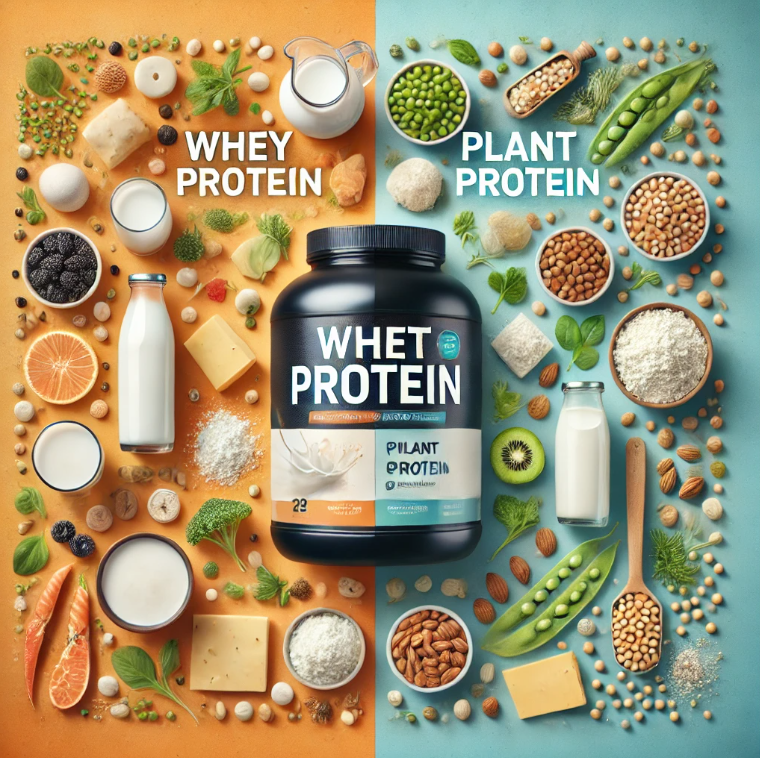Protein powders have become a staple in the health and fitness world, offering an efficient way to meet your daily protein needs. Among the most popular options, whey and plant-based protein powders often take center stage. But how do they compare? And which one should you choose for your specific goals, such as weight loss, muscle building, or improving cholesterol levels? This detailed guide will help you decide.
Understanding Whey Protein
Whey protein is derived from milk and is a by-product of cheese production. It contains all nine essential amino acids, making it a complete protein. This makes whey particularly effective for muscle recovery and growth.
Benefits of Whey Protein:
- Muscle Building: Rich in branched-chain amino acids (BCAAs) like leucine, whey protein is highly effective for muscle repair and growth. (Keyword: whey protein vs plant protein for muscle building)
- Rapid Absorption: It is quickly absorbed by the body, making it ideal for post-workout recovery.
- Supports Weight Loss: Whey protein is known to enhance satiety, which can help with weight management. (Keyword: plant protein vs whey protein for weight loss)
Disadvantages of Whey Protein:
- May cause digestive issues for those who are lactose intolerant.
- Some products may contain added sugars or artificial ingredients.
Understanding Plant-Based Protein
Plant-based protein powders are derived from sources like peas, rice, soy, and hemp. While individual plant proteins may lack one or more essential amino acids, many plant-based powders are formulated to provide a complete amino acid profile.
Benefits of Plant-Based Protein:
- Vegan-Friendly: Suitable for those following a plant-based diet.
- Rich in Fiber: Often contains dietary fiber, aiding digestion.
- Heart Health: Generally low in saturated fat and cholesterol-free. (Keyword: whey protein vs plant protein for cholesterol)
- Diverse Nutrients: Provides vitamins, minerals, and antioxidants not found in whey.
Disadvantages of Plant-Based Protein:
- May be less effective in promoting muscle growth compared to whey protein. (Keyword: is plant-based protein powder good for building muscle)
- Can have a gritty texture or earthy taste.
- Some options are less bioavailable, requiring larger servings to match whey protein’s effectiveness. (Keyword: disadvantages of plant-based protein powder)
Comparison Table: Whey Protein vs. Plant-Based Protein
| Feature | Whey Protein | Plant-Based Protein |
|---|---|---|
| Source | Milk (Animal-based) | Plants (e.g., peas, soy, rice) |
| Protein Quality | Complete Protein | Often complete (blends) |
| Digestion | Fast Absorption | Moderate to Slow |
| Muscle Building | Highly Effective | Effective with proper blends |
| Suitable for Vegans | No | Yes |
| Lactose Content | Contains Lactose | Lactose-Free |
| Cholesterol | May contain cholesterol | Cholesterol-Free |
| Texture and Taste | Smooth, Creamy | Can be gritty or earthy |
| Price | Generally Affordable | Slightly More Expensive |

Choosing the Right Protein Powder for Your Goals
1. For Weight Loss
- Both whey and plant-based protein powders can support weight loss, but plant protein has the added benefit of fiber, which promotes fullness. (Keyword: plant protein vs whey protein for weight loss)
2. For Muscle Building
- Whey protein’s BCAA content makes it the superior choice for muscle growth. However, plant-based blends with complete amino acid profiles can be effective alternatives. (Keywords: whey protein vs plant protein for muscle building, is plant-based protein powder good for building muscle)
3. For Heart Health and Cholesterol
- Plant-based protein is cholesterol-free and often preferred for individuals managing heart health. (Keyword: whey protein vs plant protein for cholesterol)
4. For Digestive Comfort
- If you’re lactose intolerant or have digestive sensitivities, plant-based protein is the better choice.
FAQs: Whey vs. Plant-Based Protein Powders
1. Is plant-based protein powder good for you? Yes, plant-based protein powder is a nutritious option, particularly for vegans and individuals with lactose intolerance. It provides essential nutrients and supports digestion.
2. Is plant-based protein powder good for building muscle? While plant-based proteins may require blends to match the muscle-building efficiency of whey, they can still be effective with proper diet planning.
3. What are the disadvantages of plant-based protein powder? Some common disadvantages include its gritty texture, less complete amino acid profile (in single-source proteins), and potentially higher cost.
4. Which is better for weight loss: plant protein or whey protein? Both can aid in weight loss, but plant protein’s fiber content may offer better satiety.
5. How does whey protein compare to plant protein for cholesterol levels? Plant protein is the better choice for managing cholesterol as it is cholesterol-free.
6. Are there discussions about whey protein vs. plant protein on Reddit? Yes, platforms like Reddit feature diverse opinions and experiences, providing valuable insights into whey protein vs. plant protein Reddit threads.
7. What is the best plant-based protein powder? The best plant-based protein powder varies based on your needs but look for ones with complete protein blends and minimal additives.
8. Can whey protein or plant protein be harmful? Excessive use of either can strain kidneys and lead to other health issues. It’s essential to use them as part of a balanced diet.


